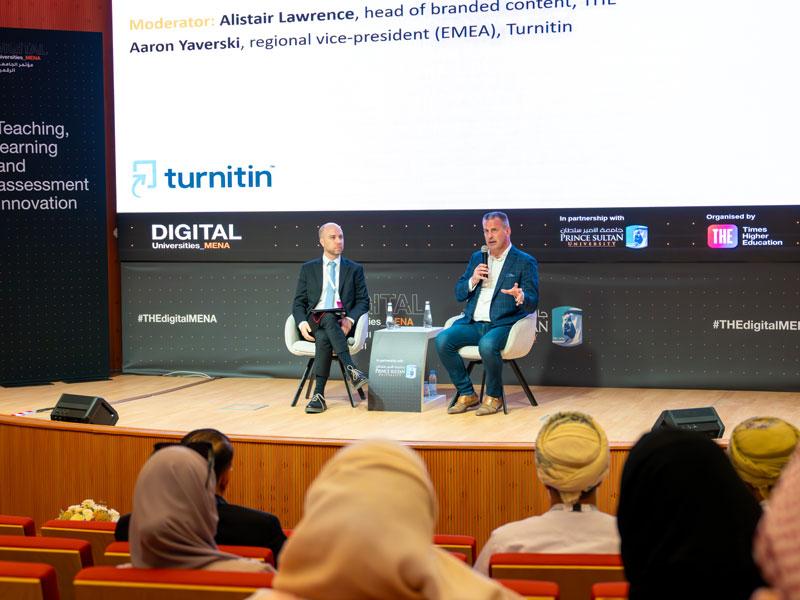Artificial intelligence has infiltrated several aspects of our lives, and we are slowly acclimatising to the idea of its being constantly around us; AI nudges us to make decisions, and many of us can relate to the feeling of its ghost-like presence. We must accept that it is here to stay and is likely to become even more present in our daily lives in the months and years to come.
AI is reshaping education in many ways. To what extent will it disrupt it? As professors, are we prepared to handle this disruption? Should we take it on or partner with it? These are all valid questions that require some thought.
AI in assessments
We can use AI to create assessments, assign difficulty levels and automate grading. Coursera harnesses the power of AI to generate content and assessments tailored to diverse learning objectives. Through AI-driven algorithms, it creates a wide array of educational materials, including assessments that align closely with course objectives.
The process begins with AI algorithms curating content in varying forms from a vast pool of resources, ranging from textbooks and online materials to academic papers and lecture notes. AI can then generate assessment items, including multiple-choice questions, true/false statements, questions requiring short answers or longer, more complex ones. These assessments are designed to evaluate students’ understanding of key concepts, problem-solving abilities and critical thinking skills.
However, it’s important to note that while AI aids in the creation of assessments, the final quality check rests with the professor. Before sharing assessments with students, professors must review and validate the questions to ensure their appropriateness and difficulty level.
This collaborative approach between AI technology and human expertise ensures that assessments meet the required standards and effectively evaluate students’ understanding of course content.
- Resource collection: AI transformers like ChatGPT are here, so what next?
- AI can help fix student evaluations
- How can we teach AI literacy skills?
Customised learning experiences
AI can help us identify students’ understanding levels and create tailor-made learning experiences. We can use it to track students’ performance and generate better recommendations and questions. We can use it to analyse students’ historical data, identify trends and suggest strategies to help them improve.
Real-time feedback
AI-driven performance analytics provide students with real-time insights into their academic progress. By aggregating data from various assessments and learning activities, AI systems can generate comprehensive performance reports, highlighting areas of strength and where improvement is needed. This immediate feedback empowers students to take proactive measures to enhance their learning outcomes.
Automation
AI algorithms can automatically grade multiple-choice and objective questions. They analyse the provided answers against the correct solutions, swiftly determining correctness without human intervention. This process drastically reduces grading time. We can also consider using natural language processing techniques to assess short answers or essays to save time. By automating routine grading tasks, we can spend more time on activities such as providing personalised feedback, designing instructional materials and engaging with students. Increased efficiency enhances educators’ productivity and enables them to devote more attention to enhancing teaching and learning experiences.
Adaptive course design
Faculty members can leverage AI to craft interdisciplinary courses and courses tailored to meet the unique needs of their students. To begin, educators must identify the intersecting areas from different disciplines and establish clear learning objectives. These objectives serve as guiding principles for course development. We can then use AI to generate content aligned with these objectives. This content may consist of curated materials such as articles, videos and other resources sourced from various disciplines.
AI’s capability to offer multimodal feedback encompassing audio, video and visuals opens up opportunities for creating engaging learning content. By combining text-based information with audio recordings and visuals, educators can enhance student engagement significantly. This approach facilitates a dynamic learning experience that caters to diverse learning preferences and fosters a deeper understanding of interdisciplinary concepts.
Innovative teaching methods
AI enables educators to experience innovative teaching methods such as gamification and simulations. Gamification elements such as points, badges and leader boards motivate students to engage more with the content. As with video games, students can use their points to unlock the next level of learning thus encouraging further understanding and mastery. Such interactive learning experiences enhance student motivation and understanding, leading to better learning outcomes. Simulation games immerse students in real-life scenarios and encourage them to make strategic decisions against virtual competitors. These kinds of simulations are useful for teaching business strategies.
Thanks to its adaptability, we can introduce AI into our teaching in various disciplines. We can teach topics such as sustainability by exploring the role of AI in energy optimisation, waste reduction and others. Similarly, we can weave the use of AI into subjects such as the internet of things and design, enriching and modernising the curriculum. As educators, we must focus on finding interesting ways to do this in our chosen areas.
AI is revolutionising higher education by helping educators offer more personalised learning experiences, improving assessment practices and improving overall educational outcomes. It can significantly enhance faculty productivity, teaching and student learning, so let us treat it as a friend and leverage its power to help higher education evolve and prepare students for living in a digital age.
K.V. Sriram is an a professor in the department of humanities and management, Manipal Institute of Technology, India.
If you would like advice and insight from academics and university staff delivered direct to your inbox each week, sign up for the Campus newsletter.




comment